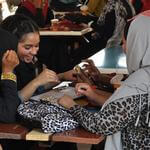Celebrating Martyr's Day in Juba
July 30, 2015. It is Martyr’s Day in John Garang’s Memorial Grounds, Juba, South Sudan. I am standing in the crowd of people, who have come to celebrate the memory of John Garang and all those who died in the civil wars against the northerners in Khartoum. Many have come to dance, sing and drum in the open fields behind the official stage. On the official stage, stiffly uniformed army units are parading, accompanied by a brass band. While we are standing here, remembering the dead of the past, there are people being killed in a new war, raging since December 2013 between a fraction of the ruling party (SPLM IO), led by Riek Machar, and the government forces, led by SPLM leader and president Salva Kiir. Starting as a personal feud, the fighting is now a matter of getting a larger share of power in the world’s youngest nation. So independence has not brought peace. This brings up the question: Did the martyrs of the past die in vain?
Despite the new war, the young men around me do express a strong pride for having an independent state. But they are weary of what President Salva Kiir will say in his address to the people today. Some hope that his speech will contribute to reconciliation between the parties, others anticipate that it will give a strong message to his opponent, that unless he gives in, there will be no mercy. On the celebration of four years of independence, on July 9, his message to Riek Machar was that he should commit to peace, because this is what the South Sudanese people badly needs. In the meantime, a new peace proposal has been submitted by the negotiators in IGADD Plus, an organization of the most influential states in the region. This is presented as a compromise proposal, suggesting a share of power between the parties both in the capital and in the regional states. On his visit to Ethiopia a week ago, the US president Barack Obama was discussing South Sudan with regional leaders. Salva Kiir was not invited. Obama’s message was still clear – unless the two parties committed to the new proposal, there may be sanctions.
In between the singing and drumming from the open fields, it is hard to hear what Salva Kiir is saying. But it turns out that he satisfies the hardliners. He says he can never accept a proposal that gives away the majority power of the oil rich state of Upper Nile, as well as Jonglei and Unity to forces loyal to his opponent. This is not just peace, he says. This is not honouring the memory of the martyrs. The warring parties are supposed to meet again for talks in Addis Ababa next week, and should agree to the agreement within August 17. But the hopes for an end to the fighting is dwindling, and the signing of a deal seems very unlikely. At the moment – it seems that the martyrs of the past died in vain. But the drummers and singers on the fields of John Garang’s Memorial Ground continue dancing into the evening.
Lovise Aalen, Juba, 30 July
Project
